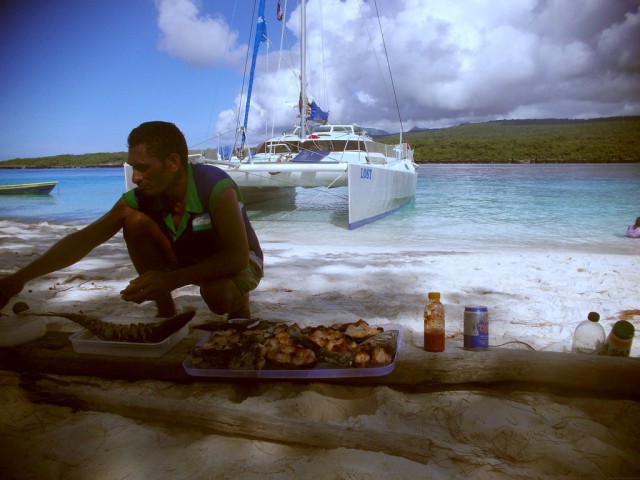Sailing Around the World And Getting By Without Cash
by Emily Richmond

Sixty-five mangos, 12 coconuts, and three rubber-banded baggies of coffee slide across the deck in two large plastic bins. There’s a broad-built man in a little boat called COUNTRY staring at me. I have no money and it’s 600 miles to the nearest ATM.
For four years, I’ve been traveling the high seas, alone aboard my sailboat BOBBIE long enough to know that being cashless doesn’t have to be a problem. For centuries, explorers have ploughed all corners of our watery world, armed with little more than improvised currencies. From the Portuguese pursuits of exotic spices in the Moluccas, to the movement of molasses across the West Indies, the sea has always remained the most flexible of marketplaces.
And so, in much the same way, today on this tiny island in the middle of the Java Sea, we shall improvise. I duck inside, grab a half-full bottle of rum and toss it to Romy, my new bounty-bearing friend. It’s a solid deal: I don’t drink at sea, and he hasn’t seen commercial grade liquor in the better part of a decade.
I’ve traded all kinds of things like that out here: a clunky machete from Costa Rica for some custom-welded bolts I needed in Indonesia, old eyeglasses for avocados in Samoa, spare hooks and line for a bucket of shrimp in El Salvador. Even when I do have cash, often locals don’t want it. Maybe we’re on a tiny atoll days away from the nearest urban center. If I’ve got a thing they want, the whole transaction is just way easier. Cash? That’s just some clunky middleman.
There are faded rock band t-shirts, stray DVDs of cheesy action movies, old issues of National Geographic — these are the things that are as good as gold out here.
But then, of course, there’s gold to be had as well. In New Guinea, where I found myself marooned for the better part of a year, I literally stopped counting the times passersby would try to hawk me bricks they’d dug up in their bush gardens — apparently leftover remnants of a war and occupiers that had long since up and gone.
I never bought any — it all just seemed too weird, and probably illegal — but I loved the mystique, the excitement, the idea that I every time I sailed away I was on my way towards the next great discovery.
And yet, there is actual money to be made out here, as well. Even today, the savvy sailor can cash in on the basic principles of supply and demand: buy the stuff that’s cheap in one place, haul it somewhere down the road where it’s harder to come by.
Take Easter Island, for example. It’s a tiny spit of land, 1,100 miles off the coast of Chile. For some inexplicable reason, bottles of Johnny Walker are insanely cheap at just over five bucks a liter. The savvy sailor could easily snug a pallet or two in the bilge and unload them in landfalls further west, where the brand fetches a price nearly ten times that. And I’ve met countless dudes doing just that, shirtless and leathery, blissed out on the same kind of rum runs that have existed for ages. Paradise is not only real for them, it’s also lucrative.
But that’s never really been my style. I much favor the exchanges that are simpler, that get to the core of what huckstering misses entirely: it’s not about who comes out ahead. Once, in this little jungle outpost called Pomio, villagers caught wind of that fact that I had solar panels on board. Before I knew it there was a steady queue of outrigger canoes dropping me their mobile phones. I was happy to oblige, it was no sweat off my back to put a little charge in their gear, but it’s what happened when they came back that got me: the old women would bring fresh coconuts to drink together, the young men would swing heaping sacks of sweet potatoes on board. It was a simple system that had nothing to do with wealth or status. It was a system of camaraderie and kindness, that approached life like it was a big pot and everyone was only expected to toss in whatever they had. And I loved it, you know? This way of living that systematically acknowledges that we’re all in this together — a currency I can really get behind.
Emily Richmond is a round-the-world solo sailor and a freelance radio producer.
Photo courtesy of the author, whose Flickr account is amazing
Support The Billfold
The Billfold continues to exist thanks to support from our readers. Help us continue to do our work by making a monthly pledge on Patreon or a one-time-only contribution through PayPal.
Comments